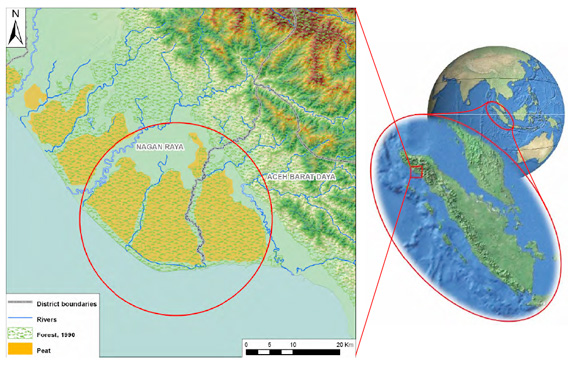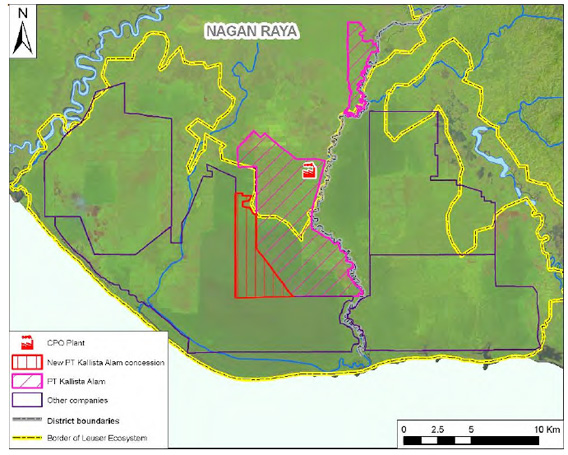Indonesia exempted 3.6 million hectares of forests and peatlands from protected status under its two-year moratorium on forest concessions, according to a revised version of its moratorium map released near the end of climate talks in Durban.
The new Indicative Map includes 10.7 million hectares of peatlands, down from 15.5 million hectares in the previous version of the map that defines areas off-limits for new concessions. Some 1.2 million hectares of previously unprotected “primary forest” has been added to the moratorium area, resulted in a net decline of 3.6 million hectares under the moratorium, according to analysis by Daemeter Consulting, an Indonesia-based forestry consultancy.
Daemeter says some of the changes appear to reflect the “inclusion of pre-existing licenses not accounted for previously in the original map”. Most of the reclassified area is oil palm concessions on peatlands.
Under its self-imposed moratorium, Indonesia permits the Ministry of Forestry to revise the Indicative Map based on field evaluations. Daemeter says further reduction in moratorium area “is expected in future six-monthly revisions as increasing numbers of pre-existing licenses are registered”.
The changes partly reflect the chaotic state of Indonesia’s concession allocation system. Oil palm plantations are typically granted by local authorities, rather than the central government, making accounting more difficult than for timber concessions allocated by the Ministry of Forestry.
But Elfian Effendi of Greenomics said business interests may also be a factor.
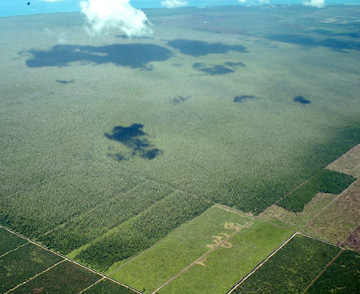 A large portion of the remaining Tripa peat swamp forests photographed in August 2008. In the foreground are planted and unplanted oil palm blocks, with further blocks being drained before clearing. These blocks have now already been cleared. Image courtesy of Tim Koalisi Penyelematan Rawa Tripa. |
“Forestry law and regulations in Indonesia are primarily designed to accommodate business interests, rather than accommodate the interests of our forests and forest communities,” Effendi told mongabay.com via email.
Indonesia’s forest moratorium is part of President Susilo Bambang Yudhoyono’s 7/26 initiative, which targets 7 percent annual economic growth and a 26 percent reduction in greenhouse gas emissions by 2020 relative to business-as-usual. Reducing deforestation and peatlands degradation is the centerpiece of his push toward low carbon development.
However the president’s efforts have been fiercely opposed by politically-powerful interests in the forestry sector, which have lined up behind the Ministry of Forestry and other agencies against Yudhoyono’s REDD+ Task Force, the agency charged with reforming the country’s forest management practices and institutions. These interests successfully weakened the moratorium, which was originally supposed to include all forests but now has gaping loopholes and only applies to “primary forests” and peatlands. Pre-existing concessions in peatlands and old-growth forests are exempted.
Trouble in Tripa
The new revision however does not let Aceh Province’s “green” governor off-the-hook for an oil palm plantation slated for development in the heart of Tripa peat swamp, an area that has the highest concentration of Sumatran orangutans. While the new Indicative Map shows an exemption for the 1,600-hectare plantation under the moratorium, groups contesting the development say it violates other regulations, including at least two laws and a prior commitment by Aceh Governor Irwandi Yusuf to impose his own moratorium in the province.
“The criminal report submitted to the Criminal Investigation Office at Police Headquarters is based on the facts and the consideration that the issuance of this particular license contradicts Government Regulation PP. No 26/2008 on the National Spatial Plan. Based on the PP No 10/2008, the Leuser Ecosystem is designated as a protected area with the status of a National Strategic Area. Therefore, issuance of oil palm plantations that are located within the Leuser Ecosystem and peat swamp areas is clearly a criminal act,” said Kamaruddin, a lawyer representing the Coalition of Communities Concerned for Tripa, a group that is suing the governor for abuse of power. The coalition says Governor Irwandi could face up to five years in prison if found guilty of the charges.
The controversy surrounding the Tripa permit caught some by surprise — Irwandi has been a champion of forest conservation in Aceh and is seen as a leader of efforts to link climate finance to forest protection through the Governors’ Climate and Forests initiative. But as Agus Purnomo and Yani Saloh, special advisers to President Yudhoyono on climate change, recently noted in an editorial in The Jakarta Globe, international financial support for reducing emissions from deforestation and degradation (REDD) programs has been slow to materialize on the ground in Indonesia.
“The province of Aceh has had a moratorium on logging for more than four years, but has still received no REDD money to compensate for its efforts,” they wrote.
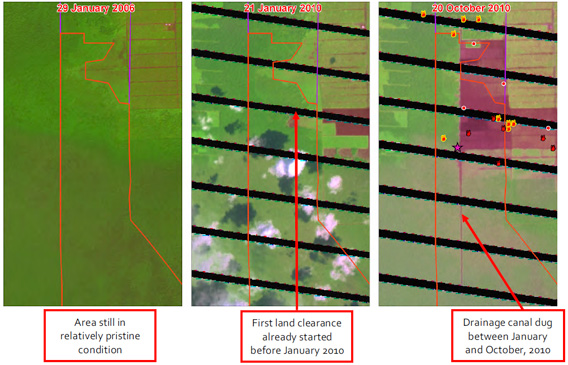 Northern section of the new concession plotted on a time series of satellite images (Spot 5: 29/1/06; Landsat 7: 21/1/10 and 20/10/20) showing damage to the area before the concession permit was ever issued. The purple star on the right hand image are orangutan nests photographed on 11/11/11. Red flames with yellow border are fire hot spots in 2011, red flames with black borders are those in 2009 and 2010, and the small red dots are fire events 2001 to 2008.
|
CITATIONS:
- Wells, P.L., N. Franklin and G.D. Paoli (2011) Preliminary Observations on the Indonesian Ministry of Forestry Decree SK.7416/Menhut-VII/IPSDH/2011: The first revision of the Indicative Maps Concerning the Suspension of New Licenses for Forest and Peatland Utilisation. Published by Daemeter Consulting, Bogor, Indonesia. (Available for download at www.daemeter.org)
- Tim Koalisi Penyelematan Rawa Tripa (2011) Tripa Truths [PDF].
- Purnomo, A and Saloh, Y. (2011) Running Out of Time, Again. The Jakarta Globe. December 19, 2011
Related articles
Aceh’s ‘green’ governor breaks Indonesia’s moratorium by granting oil palm plantation, alleges group
(11/23/2011) Aceh governor Irwandi Yusuf may have broken Indonesia’s moratorium on new concessions in peatlands when he approved an oil palm plantation in the Tripa peat swamp in August this year, alleges WAHLI, an Indonesian environmental group.
Indonesia’s new forest moratorium map improved, say experts
(07/13/2011) The latest version of Indonesia’s forest moratorium map is much improved over its predecessor, say forestry analysts from Daemeter Consulting.
Is the Ministry of Forestry undermining Indonesia’s logging moratorium?
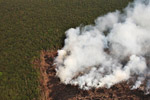
(06/28/2011) Indonesia’s Ministry of Forestry is already undermining the moratorium on new forestry concessions on peatlands and in primary forest areas, alleges a new report from Greenomics-Indonesia. The report, The Toothless Moratorium, claims that a new decree from the Ministry of Forestry converts 81,490 hectares of forest protected under the moratorium into logging areas. The area affected is larger than Singapore.
Carbon for forests will help Aceh recover from war, tsunami
(09/18/2007) Carbon credits through forest conservation will play an important role in Aceh’s recovery from decades of civil war and the devastating 2004 tsunami, which left more than 167,000 people dead and 500,000 homeless in the Indonesia province, said Aceh governor Irwandi Jusuf in meeting in San Francisco.
